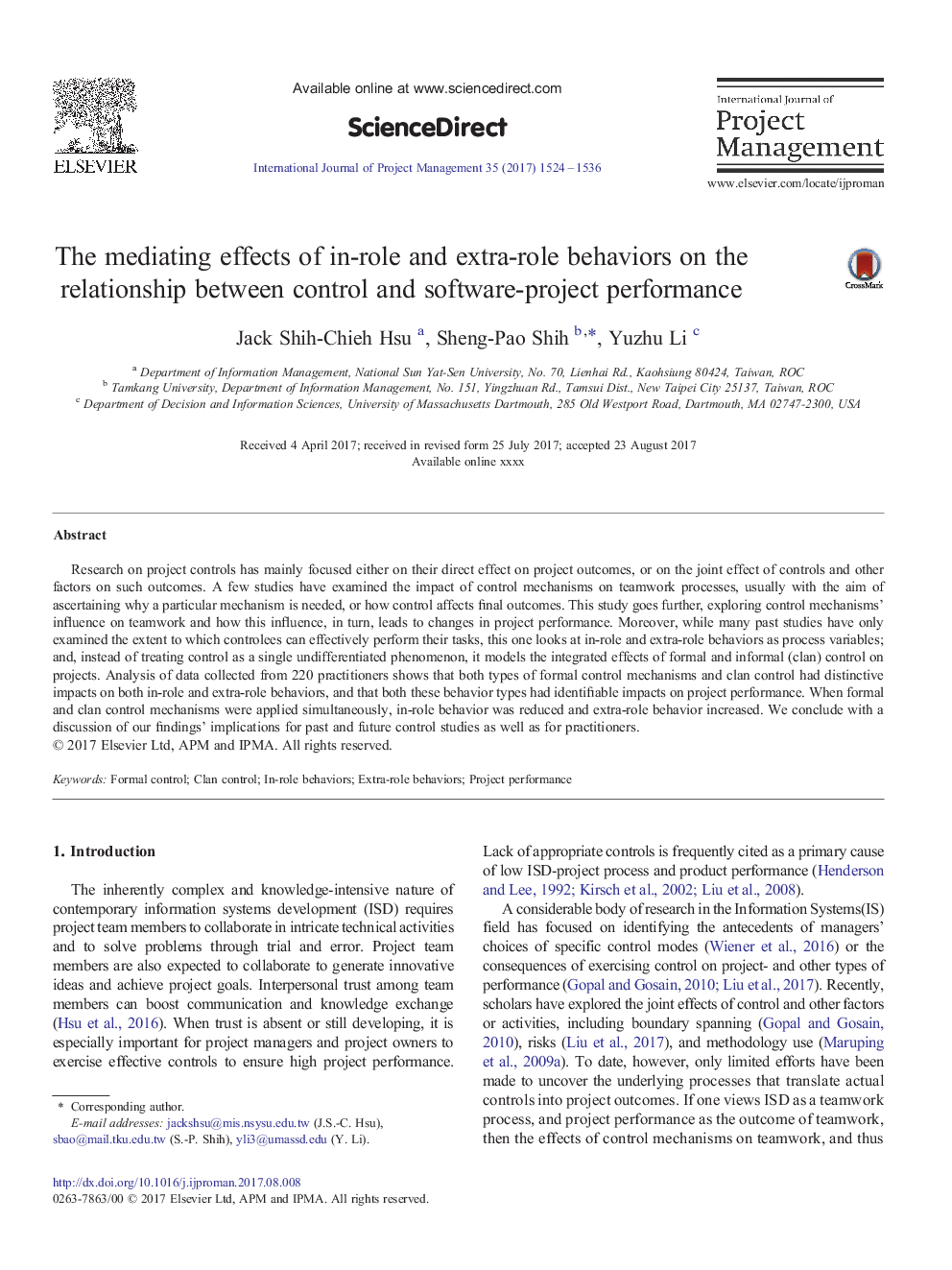| کد مقاله | کد نشریه | سال انتشار | مقاله انگلیسی | نسخه تمام متن |
|---|---|---|---|---|
| 4922061 | 1429652 | 2017 | 13 صفحه PDF | دانلود رایگان |
عنوان انگلیسی مقاله ISI
The mediating effects of in-role and extra-role behaviors on the relationship between control and software-project performance
ترجمه فارسی عنوان
اثر متقابل رفتارهای نقش و نقش اضافی بر رابطه بین عملکرد کنترل و نرم افزار-پروژه
دانلود مقاله + سفارش ترجمه
دانلود مقاله ISI انگلیسی
رایگان برای ایرانیان
کلمات کلیدی
کنترل رسمی، کنترل قبیله، رفتارهای درونی، رفتارهای اضطراری، عملکرد پروژه،
ترجمه چکیده
تحقیقات در مورد کنترل پروژه عمدتا بر تأثیر مستقیم آنها بر نتایج پروژه یا تاثیر مشترک کنترل ها و عوامل دیگر بر چنین نتایجی متمرکز است. چندین مطالعه تأثیر مکانیسم های کنترل در فرایندهای کار گروهی را مورد بررسی قرار داده اند، معمولا با هدف تعیین اینکه چرا یک مکانیسم خاص مورد نیاز است یا اینکه چگونه کنترل نتایج نهایی را تحت تاثیر قرار می دهد. این مطالعه بیشتر می کند، بررسی تاثیر تأثیر مکانیسم های کنترل در کار گروهی و تاثیر این تاثیر، به نوبه خود منجر به تغییر در عملکرد پروژه می شود. علاوه بر این، در حالی که بسیاری از مطالعات گذشته تنها مورد بررسی قرار گرفته اند که چگونه می توان نقش های اجرایی را به طور موثر وظایف خود انجام داد، این رفتار به عنوان متغیرهای فرایند نقش در نقش و نقش اضافی را بررسی می کند؛ و به جای کنترل کنترل به عنوان یک پدیده تفرقه ناپذیر، اثرات یکپارچه کنترل رسمی و غیر رسمی (قبیله ای) بر پروژه ها را مدل می کند. تجزیه و تحلیل داده های جمع آوری شده از 220 تمرین کننده نشان می دهد که هر دو نوع مکانیزم کنترل رسمی و کنترل قبیله تأثیرات متفاوتی بر رفتارهای درون نقش و نقش اضافی داشتند و هر دو این نوع رفتارها اثرات قابل شناسایی بر عملکرد پروژه داشتند. هنگامی که مکانیزم کنترل رسمی و رسمی به طور همزمان اعمال شد، رفتار درونی نقش کمتری داشت و رفتار اضافی نقش افزایش یافت. ما با بحث درباره مفاهیم یافته های ما برای مطالعات کنترل گذشته و آینده و نیز برای پزشکان نتیجه می گیریم.
موضوعات مرتبط
مهندسی و علوم پایه
سایر رشته های مهندسی
مهندسی عمران و سازه
چکیده انگلیسی
Research on project controls has mainly focused either on their direct effect on project outcomes, or on the joint effect of controls and other factors on such outcomes. A few studies have examined the impact of control mechanisms on teamwork processes, usually with the aim of ascertaining why a particular mechanism is needed, or how control affects final outcomes. This study goes further, exploring control mechanisms' influence on teamwork and how this influence, in turn, leads to changes in project performance. Moreover, while many past studies have only examined the extent to which controlees can effectively perform their tasks, this one looks at in-role and extra-role behaviors as process variables; and, instead of treating control as a single undifferentiated phenomenon, it models the integrated effects of formal and informal (clan) control on projects. Analysis of data collected from 220 practitioners shows that both types of formal control mechanisms and clan control had distinctive impacts on both in-role and extra-role behaviors, and that both these behavior types had identifiable impacts on project performance. When formal and clan control mechanisms were applied simultaneously, in-role behavior was reduced and extra-role behavior increased. We conclude with a discussion of our findings' implications for past and future control studies as well as for practitioners.
ناشر
Database: Elsevier - ScienceDirect (ساینس دایرکت)
Journal: International Journal of Project Management - Volume 35, Issue 8, November 2017, Pages 1524-1536
Journal: International Journal of Project Management - Volume 35, Issue 8, November 2017, Pages 1524-1536
نویسندگان
Jack Shih-Chieh Hsu, Sheng-Pao Shih, Yuzhu Li,
